#indian engagement photographer
Explore tagged Tumblr posts
Text
What Are The Trending Poses For Indian Bride Photography?
Indian weddings are a symphony of traditions, colors, and emotions. Every moment, every ritual, and every emotion deserves to be captured in all its glory. Indian bride photography is a world of its own, and as it evolves, so do the poses that beautifully capture the essence of these celebrations. In this blog, you will explore the trending poses for Indian bride photography, helping brides and photographers alike create timeless memories.

Popular Poses For The Indian Bride Photography
Indian weddings have numerous traditions to follow that provide various bride photography ideas. There have been some poses that are on trend, some of which have been elaborated on below.
1. Mirror Reflection
Mirrors provide an enchanting backdrop for bridal photography. The bride gazes into a mirror, allowing for a creative and artistic composition. It reflects her beauty and the intricate details of her attire. Search for the Indian ceremony photographer for the best wedding photographs.
2. The Classic Portrait
The enduring charm of the classic bridal portrait lies in its timelessness. Cloaked in her exquisite wedding attire, the bride exudes an aura of grace and poise. This pose eternally encapsulates the bride's unparalleled elegance and innate beauty, making it a cherished hallmark of bridal photography.
3. Twirling Lehenga
The twirling lehenga pose, a recent trend, features the bride gracefully spinning, causing her Lehenga to billow out, forming a visually captivating moment. This playful and dynamic shot infuses an element of whimsy, contributing to the collection's charm and vibrancy.
4. Candid Moments
Candid moments are treasured in Indian weddings. Natural, unposed shots capture genuine emotions – laughter, tears, and stolen glances. These shots bring authenticity to the wedding album.
5. Mehendi Close-Up
Mehendi, with its intricate designs, deserves a spotlight. Close-up shots of the bride's hands and feet adorned with mehendi reveal the artistry and profound symbolism behind this beloved tradition. Look for an Indian engagement photographer to have quality wedding photographs and videos.
Go With Trends For Alluring Wedding Pictures!
Indian bride photography is a canvas filled with traditions, colors, and emotions. The trending poses for Indian brides embrace both tradition and modernity, offering a diverse range of options for photographers and brides to create lasting memories. Remember that the most important aspect of these photographs is to authentically capture the emotions and essence of the beautiful journey that is an Indian wedding. For the best photography, you must connect with Creations by Sam. They provide photography and video services for engagements, weddings, corporate events, live streams, etc. For more information, call them today!
0 notes
Text
Business Headshot Photographer
You may achieve great things with your business headshots if you believe that a picture speaks a thousand words. It can—and ought to—express the values, objectives, mission, and purpose of your business. Said simply, it's not easily done. Apart from while collaborating with Alain Martinez Studio! We promise an amazing experience and offer expert headshots that complement the identity and brand of your company.

#hindu bridal photography#best indian wedding photographers#engagement photography#wedding videography nyc
0 notes
Text

#wedding#asian wedding#wedding photography#bridal#bride to be#real bride#indianwedding photography#wedding idea#just engaged#indian wedding photographers california
0 notes
Text
- Planning Video Scenes for Picture-Perfect Couple Dancers - Nikita and Jeet Sagaai Teaser Video -
-Planning Video Scenes for Picture-Perfect Couple Dancers-
The Engagement Party
Capturing the essence of love and tradition, we recently had the pleasure of providing Hindu engagement party videography services for a delightful Indian couple at the Blue Room Sports Venue in Harrow, London.
This wasn't our first time at the Blue Room – in fact, it's become somewhat of a second home for us, having covered numerous traditional engagement and wedding ceremonies for Indian couples.
http://www.foreverlovewedding.com/
With many years of experience in every type of wedding service, we can also easily adapt to other suppliers during our couples' engagement parties and weddings.
This lovely couple's engagement season has actually started with Hindu ritual ceremony while food was served to guests. The couple then received gifts from both sides of families and had the ring exchanged on stage. As part of the tradition, the groom to be would also receive an engagement ring!
Video Story Board Planning
The most epic part was the dance! There were various dance performances. The couple dance had the most cheers. It was a seamless performance. The couple has sent us their dance rehearsal before. We had catch-up meetings about every 2-4 weeks to plan the scenes of the video which tells their story. To capture the best scene, we took into account the colours, outfits, and decoration choices and brought suitable types of equipment.
The Fancy Videography Effects
When watching the final video, you can see that we played with different props, and did various things to enhance the video. To count a few - the night drone shots with smoke bomb; three cameras approach (A-roll for documentary shots showing how the guests would see and experience the event, B-roll for beautiful cinematic shots and a hidden camera facing the audience, to capture their expression with wide angle shots); the couple and guest interviews. Everything is planned according to the desired end result which we agreed to produce during the meeting with the couple.
The Trend of Couple Dance
This year, we have witnessed a rising trend of couples incorporating special dance performances into their weddings, with this unique and personal touch becoming a favourite among family members, relatives, and guests. Our journey this year included another remarkable wedding in Liverpool, where a Hong Kong couple also mesmerised their guests with a similar dance performance.
In the end, we wrapped our shoot smoothly, and the couple was overjoyed with their teaser, highlight, and feature videos. We extend our heartfelt wishes to them for their wonderful and everlasting love.
Look forward to working with them again on their wedding day!
Deep dive into the magical moments, feel free to explore their videos on our website, Facebook, and Vimeo pages.
londonpunjabweddingvideographer #blueroomsportsvenue #Sagaai #londonpunjabweddingphotographer #londonpunjabweddingvideos #londonsikhweddingvideographer #londonsikhweddingvideos #blueroomsportsvenueweddingphotos #blueroomsportsvenueWeddingVenuephotos #blueroomsportsvenueweddingphotosample #blueroomsportsvenueWeddingVenuephotosample #blueroomsportsvenueweddingphotosamples #blueroomsportsvenueWeddingVenuephotosamples #blueroomsportsvenueweddingvideography #blueroomsportsvenueWeddingVenuephotography #londonsikhism #londonindianbrides #londonindianweddingphoto #londonsikhweddingphotographer #ukmultiheritagecouple #londonmultiheritagecouple #multiheritagecouplewedding #multiheritagecouple #londonmultiheritagecouple #multiheritagecouplewedding #multiheritagecouple #interracialmarriage #interracialmarriagephoto
weddingvideographersurrey #weddingvideographysurrey
kentweddingphotographer #kentweddingphotography
kentweddingvideographer #kentweddingvideography
weddingphotographerkent #weddingphotographykent
weddingvideographerkent #weddingvideographykent
essexweddingphotographer #essexweddingphotography
essexweddingvideographer #essexweddingvideography
weddingphotographeressex #weddingphotographyessex
weddingvideographeressex #weddingvideographyessex
sussexweddingphotographer #sussexweddingphotography
sussexweddingvideographer #sussexweddingvideography
weddingphotographersussex #weddingphotographysussex
weddingvideographersussex #weddingvideographysussex
berkshireweddingphotographer #berkshireweddingphotography
berkshireweddingvideographer #berkshireweddingvideography
weddingphotographerberkshire #weddingphotographyberkshire
weddingvideographerberkshire #weddingvideographyberkshire #londonthepunjabikalireceremonyphotography #ukindianweddingvideography #londonpunjabweddingvideographer #londonpunjabweddingphotographer #londonpunjabweddingvideos #londonsikhweddingvideographer #londonsikhweddingvideos #londonsikhism #londonindianbrides #Sagaaivideo #Sagaaiphoto #Sagaaiphotography blueroomsportsvenueweddingphotography blueroomsportsvenueWeddingVenuephotographer #blueroomsportsvenueweddingphotographer blueroomsportsvenueWeddingVenueweddingvideography blueroomsportsvenueWeddingVenueweddingvideographer blueroomsportsvenueweddingphotoshoot #blueroomsportsvenueWeddingVenueweddingphotoshoot #blueroomsportsvenueWeddingVenue londoninterracialcouplewedding #ukinterracialcouplewedding #ukinterracialmarriagephotographer #interracialcouple #londoninterracialmarriagephotographer #indianweddingdressuk #indianbridetobeuk #multiheritagecouplewedding #multiheritagecouple #interracialmarriage #interracialmarriagephoto #ukinterracialmarriage #londoninterracialmarriage #interracialcoupleweddingphotographylondon #londonindianweddingphoto #londonsikhweddingphotographer #ukmultiheritagecouple #londonmultiheritagecouple #multiheritagecouplewedding #multiheritagecouple #londonmultiheritagecouple #londonSagaaivideo #londonSagaaiphoto #londonSagaaiphotography #londonSagaaiphotographer #londonSagaaivideography #londonSagaaivideographer #ukinterracialcoupleweddingphotographer #londoninterracialcouple #Sagaaiphotographer #Sagaaivideography #Sagaaivideographer
#londonweddingphotography#weddingphotographer#weddingvideographer#londonweddings#londonweddingvideography#londonweddingphotographer#weddingphotos#weddingphotography#londonweddingvideographer#weddingvideography#indian wedding videographer#indian wedding videography in san jose#indian wedding photographers california#indian wedding dj#indian wedding cards#indian wedding planner#saree wedding#sagaai engagement video#sagaai video#indian wedding photo
1 note
·
View note
Text
Atlanta Wedding Photographers Capture Fun Bollywood Engagement Session
As an Atlanta wedding photographer I get all kinds of requests. A few weeks ago Sonja and Faizon contacted me and wanted to do a pre wedding photo session. I asked her what she meant by that and she said she wanted to do a Bollywood themed photoshoot at a train station then a food based shoot at a restaurant since they were foodies.
We contacted the Southern Railway Museum located south of Duluth and asked if it was ok to shoot there and they said yes as long as you are not bringing some big lights. I decided it would be best to start in the morning on the square in downtown Duluth, since they have so many great restaurants and there are many photo locations within walking distance.
Saturday morning came and we started at 9:30am at the Simply Done Donut shop. It is a family owned artisanal donut store with these great little flavorful donuts. The couple decided to go for the sprinkled donuts since it matched their outfits. We got our donuts and went to the courtyard and Sonja started playfully feeding Faizon. We then moved to a couple of cute locations by some windows and flowers. Once we finished there we went to the fountain in front of the courthouse where Faizon pretended to propose to Sonja with the miniature donuts. Sonja was so sassy and had a ball with it. Once we got all our shots downtown we moved on to the train museum.
We arrived at the train museum just as they were opening. We did a few shots of Sonja in her engagement dress then she changed into her Sari that was a copy from one of her favorite bollywood movies. We reenacted the scene of the girlfriend trying to catch the train her boyfriend was on. It was a beautiful Sari and they were so determined to reenact the scene. It was so much fun! We changed platforms and took some more photos to get more options.
We chatted a lot where I learned where they came from and where Sanja came from India and can speak Hindi while Faizon’s parents came from Pakistan. They are going to do their weddings in Atlanta and on the beach in Panama City. It was an honor to spend time with such a sweet couple. It is truly an honor being an Atlanta wedding photographer.
Thanks for checking out this Atlanta wedding photographers blog! I hope you enjoyed the read and found it helpful! Make sure you keep coming back to our blog to see what the Atlanta wedding photographers at Atlanta Artistic Weddings get up to! If you’d like to contact me go to the contact page and drop me a line at https://www.atlantaartisticweddings.com/contact-atlanta-wedding-photographer. I would love to hear from you!
Thanks again!
#Bollywood#Indian wedding photography#Atlanta wedding photographers#Atlanta weddings#Atlanta#photographers#photographer#Bollywood Engagement#google#Google Reviews
0 notes
Text
Indigenous People's Day
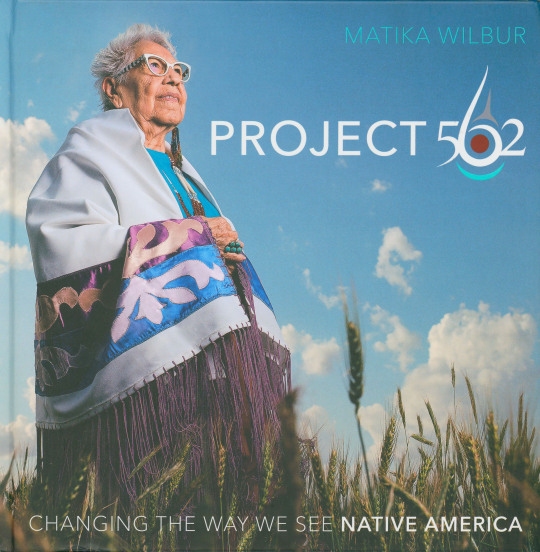
DR. HENRIETTA MANN Cheyenne
On this Indigenous Peoples' Day, we are featuring Matika Wilbur’s recent publication Project 562: Changing the Way We See Native America, published by Ten Speed Press in 2023. Wilbur (b. 1984) is a visual storyteller and member of the Swinomish and Tulalip peoples of coastal Washington. She holds a degree from the Brooks Institute of Photography alongside a teaching certificate that has shaped her style of educating through narrative portraits.
Project 562: Changing the Way We See Native America, a book born from a documentary project of the same name, resolves to share contemporary Native issues and culture. In 2012 Wilbur set out from Seattle to visit and photograph all 562 plus Native American sovereign territories in the United States.
Wilbur’s engagement with the communities she visited resulted in the creation of hundreds of dynamic portraits and documentation of conversations about “tribal sovereignty, self-determination, wellness, recovery from historical trauma, decolonization of the mind, and revitalization of culture.” She refers to her portraiture approach as “an indigenous photography method” that includes several hours and sometimes days of interaction with the participants, an exchange of energy and gifts, and asking sitters to choose their portrait location. The outcome is a stunning collection of Native narratives and portraits.

GREG BISKAKONE JOHNSON Lac Du Flambeau Band of Lake Superior Chippewa Indians
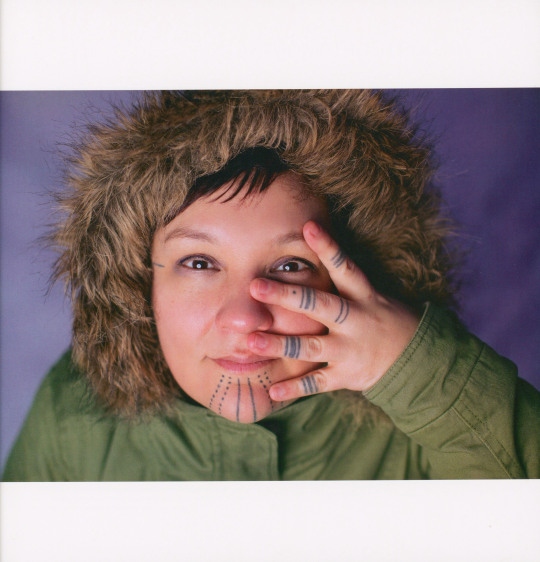
HOLLY MITITQUQ NORDLUM Iñupiaq
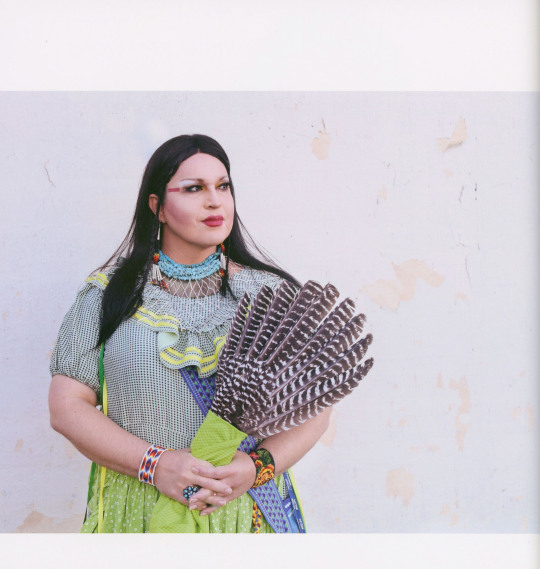
J. MIKO THOMAS Chickasaw Nation
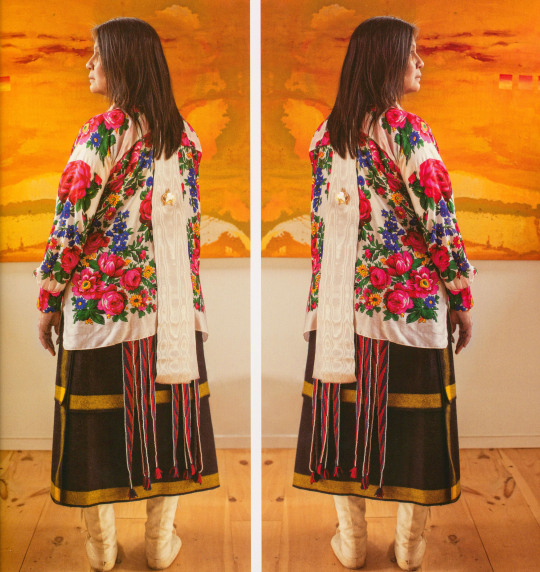
MOIRA REDCORN Osage, Caddo
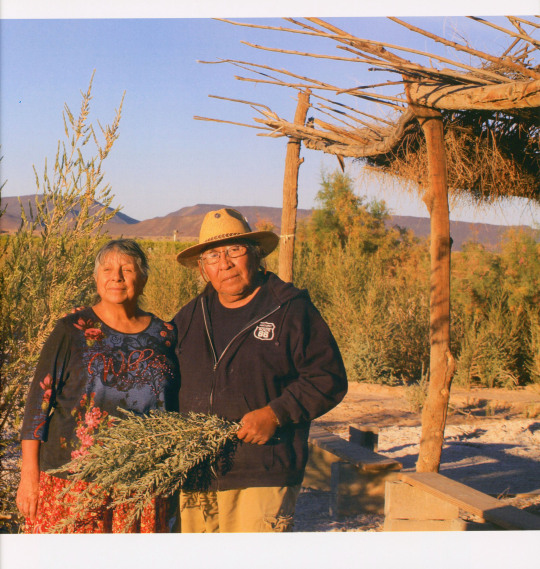
HELENA and PRESTON ARROW-WEED Taos Pueblo/Kwaatsaan, Kamia

STEPHEN YELLOWTAIL Apsáalooke (Crow Nation)

LEI'OHU and LA'AKEA CHUN Kānaka Maoli
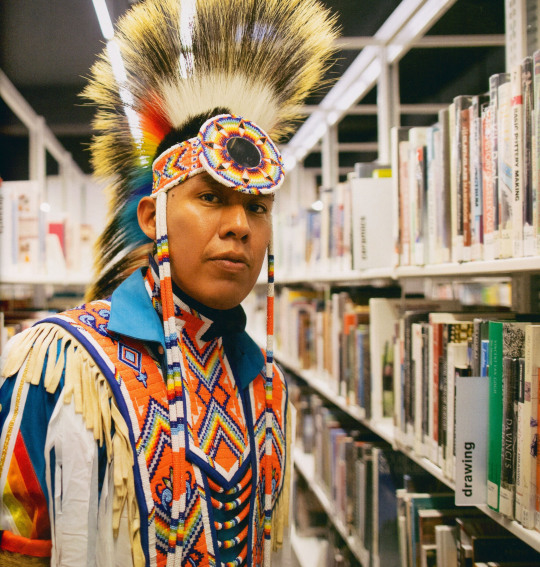
ORLANDO BEGAY Diné
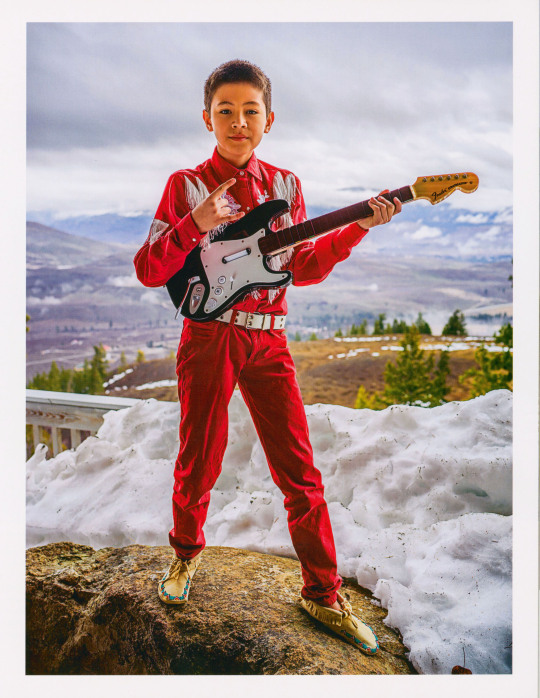
KALE NISSEN Colville Tribes
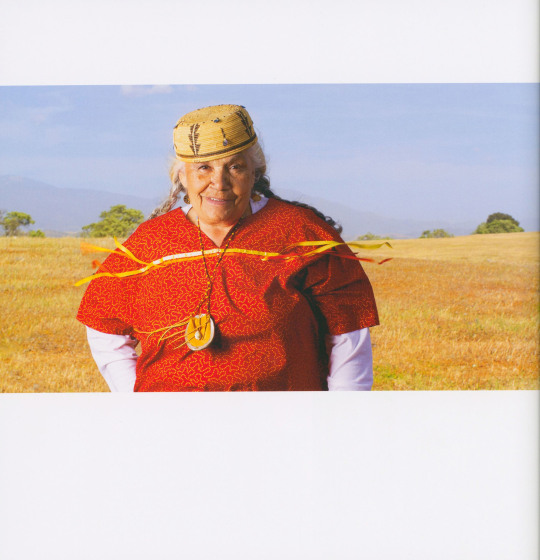
GRACE ROMERO PACHECO Santa Ynez Band of Chumash Indians
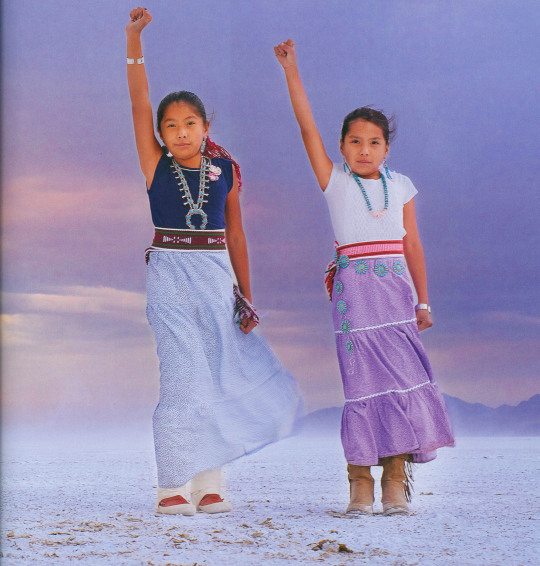
ISABELLA and ALYSSA KLAIN Diné
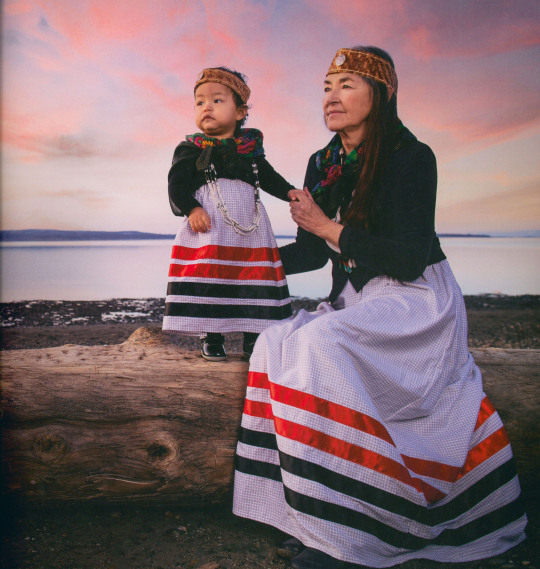
NANCY WILBUR Swinomish
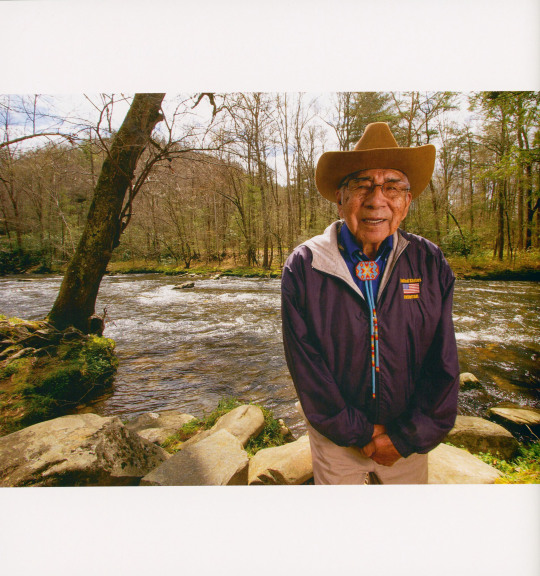
DR. JEREMIAH "JERRY" WOLFE Eastern Band of Cherokee Indians
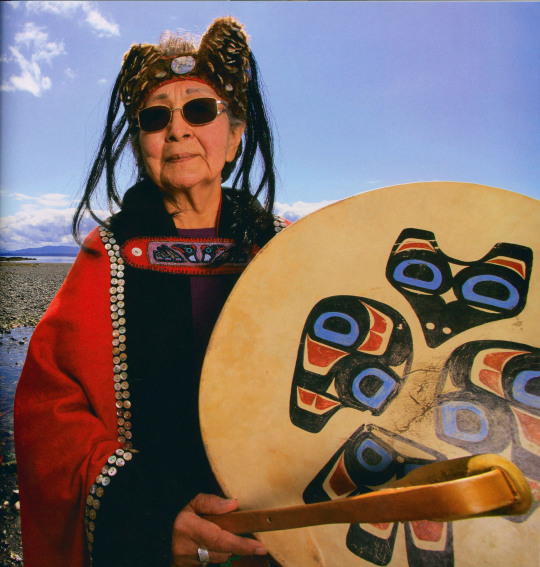
RUTH DEMMERT Tlingit
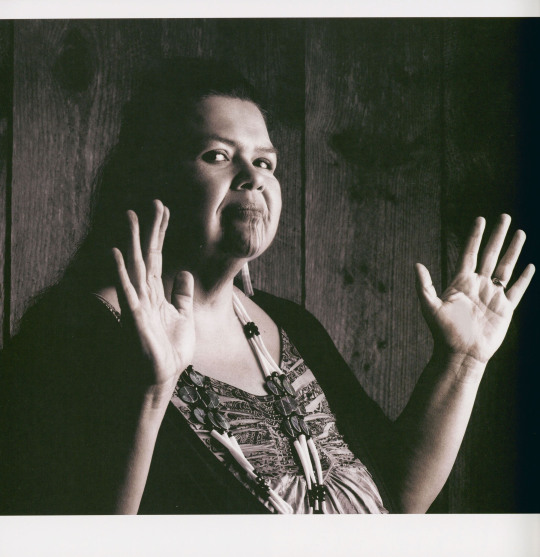
MARVA SII~XUUTESNA JONES Tolowa Dee-Ni' Nation, Yurok, Karuk, Wintu
Matika Wilbur will be speaking on UW-Milwaukee's campus Thursday, November 16 from 6-7p.m. in conjunction with her exhibition Seeds of Culture: The Portraits and Voices of Native American Women on view at the Union Art Gallery November 16 through December 15, 2023.
-Jenna, Special Collections Graduate Intern
We acknowledge that in Milwaukee we live and work on traditional Potawatomi, Ho-Chunk, and Menominee homelands along the southwest shores of Michigami, part of North America’s largest system of freshwater lakes, where the Milwaukee, Menominee, and Kinnickinnic rivers meet and the people of Wisconsin’s sovereign Anishinaabe, Ho-Chunk, Menominee, Oneida, and Mohican nations remain present.
#indigenous peoples' day#matika wilbur#project 562#Ten Speed Press#Native Americans#holidays#UWM Native American Literature Collecton
846 notes
·
View notes
Text
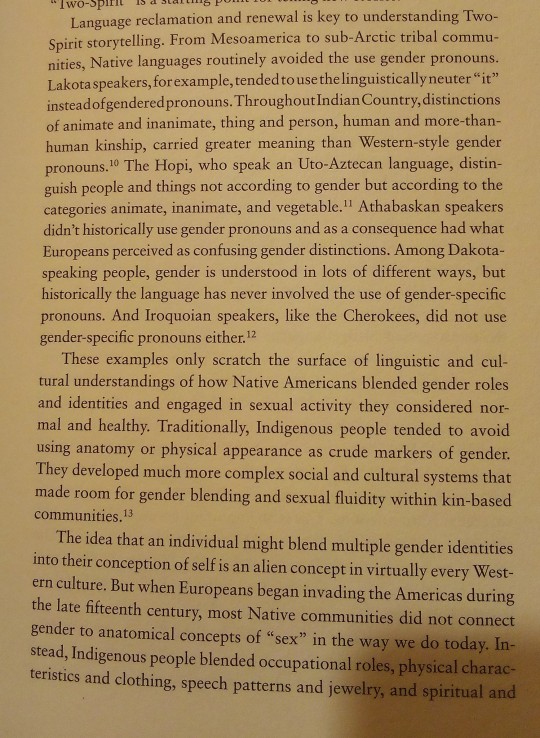
A passage from Reclaiming Two-Spirits: Sexuality, Spiritual Renewal & Sovereignty in Native America by Gregory D. Smithers.
[Image ID:
A photograph of a page from the book mentioned above, which reads:
"Language reclamation and renewal is key to understanding Two-Spirit storytelling. From Mesoamerica to sub-Arctic tribal communities, Native languages routinely avoided the use gender pronouns. Lakota speakers for example, tended to use the linguistically neuter "it" instead of gendered pronouns. Throughout Indian Country, distinctions of animate and inanimate, thing and person, human and more-than-human kinship, carried greater meaning than Western-style gender pronouns. The Hopi, who speak an Uto-Aztecan language, distinguish people and things not according to gender but according to the categories animate, inanimate and vegetable. Athabaskan speakers didn't historically use gender pronouns and as a consequence had what Europeans perceived as confusing gender distinctions. Among Dakota-speaking people, gender is understood in lots of different ways, but historically the language has never involved the use of gender-specific pronouns. And Iroquoian speakers, like the Cherokees, did not use gender-specific pronouns either.
These examples only scratch the surface of linguistic and cultural understandings of how Native Americans blended gender roles in and identities and engaged in sexual activity they considered normal and healthy. Traditionally, Indigenous people tended to avoid using anatomy or physical appearance as crude markers of gender. They developed much more complex social and cultural systems that made room for gender blending and sexual fluidity within kin-based communities.
The idea that an individual might blend multiple gender identities into their conception of self is an alien concept in virtually every Western culture. But when Europeans began invading the Americas during the late fifteenth century, most Native communities did not connect gender to to anatomical concepts of "sex" in the way we do today. Instead, Indigenous people blended occupational roles, physical characteristics and clothing, speech patterns and jewelry, and spiritual and... (text ends here)"
End image ID.]
#lgbtq#lgbt#two spirit#2s#lgbtq2ia+#queer#gender nonconforming#multigender#qpoc#indigenous literature#indigenous history#our pics#queer history#resources#reference
117 notes
·
View notes
Text
Stats Part 3
Now that Round 3 is over, we're down to 32 (well, 33) remaining artworks which feels about time to check in on how our statistics are doing!
And if you're not interested in statistics, I (Mod Salix) wanted to talk about the polls. You may have noticed that I've been trying to keep to 4 polls a day, which would mean that Round 4 is only going to be 4 days, and Round 5 would post everything in two days. Starting in Round 6, we'll probably re-institute week long polls. Hopefully none of us will lose track of what day to post the next round!
We have 20 artworks by male artists, 10 by female artists, and 4 by groups or unknowable entities! And of those, one person is Black, two are Aboriginal (one of whom is Mestizo and Kichwa, the other of whom is Aboriginal Australian), one is Asian-American (and two are Chinese living in China as opposed to living somewhere they're a minority), and one is Indian-British. And also three are left from gay men about the AIDS crisis, in addition to the AIDS memorial quilt, and one lesbian comic.
There are six American artists (including the Asian-American mentioned above), and three Chinese artists (including the Asian-American mentioned above), as well as three Russians (including Ilya Repin, who was born in the future Ukraine and lived near St. Petersburg), technically two different pieces by the same Dutch artist (hi van Gogh), and one each from Argentina, Serbia, Ecuador, Colombia, Canada, Italy, Northern Ireland, Poland, Australia, Finland, Germany, France, and Britain. And one artist I have listed as Denmark/Germany/France, because August Friedrich Schenck was born in a place that was Denmark at the time, Germany now, and worked mostly in France.
Of the pieces with known locations, eight are in the United States (four specifically in New York), two each in Australia and Russia, and one each in Argentina, Finland, Italy, Ireland, the Netherlands, Poland and one in a private collection.
There are two archaic pieces of art, Judith is our last standing piece from anything between archaic and 1843, 8 pieces of art from the 1800s, although five are from 1878 to 1896, one from 1903, two from the 70s or 80s, 5 from the 90s, four from the 00s, four from the span of 2014 to 2016, and three from the last two years. And two unknown dates and the AIDS memorial quilt which is still being added to.
There are 15 paintings, 7 installation arts, one comic, one photograph, one cave art, one sketch, one tattoo, and one fiber art slash installation. And the most common subject of the art are five queer related art pieces, although I have four each I summed up as either horror or grief/anguish.
And, lastly, someone sent in an ask in like Round 1 asking about statistics regarding whether being in first or second place in the poll biased anything. I'm not actually a statistician, so I can't answer that question, but I did compile the numbers of how many first-positioned vs second-positioned arts won! Surprisingly, Round 1 had 64 firsts to 63 seconds (and one tie), Round 2 had 29 to 35, and Round 3 had 15 to 17. Technically speaking that's not a large enough sample size to determine bias but it's... interesting?.
I was going to make a scatterplot featuring the number of votes in each poll to track engagement, but I haven't actually figured out how to do one in Google Sheets yet so maybe at the end of the bracket.
#definitely not inspired by a tag i saw on a poll spawning me to check ratio of men to women artists remaining#stats for nerds#mod salix#announcement#the most baffling poll is marat vs dusseldorf museum kunst palast somehow only had 146 votes? that can't be right#edit: if that one WAS hidden we had no way of telling :( it was finally beaten though#second edit: i included oswaldo guayasamin in the stats even though he was knocked out by keith haring :( sorry
41 notes
·
View notes
Text
India’s election calculus is tricky. When Narendra Modi led the Hindu nationalist Bharatiya Janata Party (BJP) to power in 2014, he increased his party’s parliamentary seat tally to 282 from 116, essentially by gaining 12 percentage points of the popular vote. It was the first time since 1984 that a single Indian party won enough seats to form a government on its own.
The Indian National Congress party led the ruling coalition that Modi and the BJP defeated in 2014; the party’s vote share fell by 9 percentage points, but its seats dropped from 206 to a mere 44. Five years later, the BJP’s vote share rose again, to 37 percent, giving Modi’s party 303 seats. Congress increased its number of seats to 52, but as in 2014, that wasn’t even enough to merit a formal leader of the opposition in parliament.
In the six-week national election that concluded this month, the BJP’s vote share dropped only marginally, to around 36 percent, but its number of seats fell dramatically, to 240—causing the party to lose its majority. Although Congress’s vote share rose modestly to around 21 percent, its seats increased to 99. As a result, India will have an official leader of the opposition for the first time in a decade. Rahul Gandhi, the Congress party leader and heir to India’s most illustrious political dynasty, may well play that role.
That may seem like a small achievement for India’s beleaguered opposition—and the election result was still the third-worst performance for Congress since India’s first vote in 1952—but it represents a change surprising and seismic enough for some analysts to conclude that Modi’s latest victory was “Pyrrhic,” and that the opposition now has a foundation to win in 2029. As the former British Prime Minister Harold Wilson quipped, “A week is a long time in politics”—and five years an eternity.
In 2029, Modi will be 78 years old, but this year, he still ran a campaign based on his own record and personality. The BJP’s manifesto included more than 50 photographs of Modi. Much commentary about the results has focused on Modi’s declining popularity. Given his political dominance, it is natural for his critics to enjoy a moment of schadenfreude. On the campaign trail, Modi’s rhetoric sounded more shrill, critical of minorities, and insulting toward his opponents; during the election, he even implied that he was divinely ordained to lead India.
This year’s election has also undermined the argument that Modi’s main rival, Rahul Gandhi, is a political lightweight overwhelmed by India’s complexities. Gandhi is descended from three former prime ministers, including India’s first, Jawaharlal Nehru. (His mother, Sonia, serves in the upper house of parliament.) Now 54, Gandhi has been a member of parliament since 2004, winning six of the seven elections that he has contested. Yet the BJP has carried out a relentless and remarkably effective propaganda campaign against him. Modi has described him as a shehzada, or crown prince, while BJP ministers have dismissed him as Pappu, a pejorative term for a young boy of limited intelligence.
Unlike Modi, Gandhi does not assert that he has all the answers; he listens, an approach that may have helped him during the election. He likes to engage the public, and since September 2022 he has led two long marches across the country—the Bharat Jodo Yatra (Unite India March) and the Bharat Jodo Nyay Yatra (Unite India for Justice March)—that electrified the masses and transformed his image. According to some estimates, Gandhi wrested 41 parliamentary seats from areas where he marched. He talked to constituents, listened to voters, and spoke about social justice, women’s emancipation, empowering the weak and the dispossessed, and bringing people together.
Those topics may seem mawkish, but India’s last decade has been a period of considerable strife. Discrimination against Muslims has grown, with mosques targeted or claimed by Hindus, homes bulldozed, and interfaith marriages discouraged. The triumphal inauguration of a Hindu temple—sanctioned by the Indian Supreme Court—on the site of a mosque razed in 1992 only further alienated Muslims. The BJP’s policy of imposing the Hindi language in states where it is not spoken widely has fueled animosity. Youth unemployment has risen in many parts of the country, along with inequality.
As in the past, Modi’s campaign focused on divisive issues—but more voters than in the last two elections seemed to listen to Gandhi this time around. These voters likely don’t care about more Indians being listed in global rankings of billionaires; they are uninterested in gleaming high-rises and malls, speedier trains, superior airports, or toll roads connecting long distances. Their concerns are for more access to water, food, electricity, jobs, and justice. Gandhi seemed to fashion the Congress manifesto to respond to those concerns.
This is not to suggest that, if elected to power, the Congress party would meet these perennial needs. Having ruled India for 54 of its 76 years since independence, Congress must bear the blame for India’s lack of development. The party deserves credit for introducing economic liberalization in 1991, but its support for free-market reforms has often been cautious rather than enthusiastic. Furthermore, although Gandhi speaks of harmony, there have been several disturbances under Congress party rule in India—the most notorious being the massacre of Sikhs in 1984 in retaliatory violence after the assassination of Prime Minister Indira Gandhi, Rahul’s grandmother.
Nonetheless, Gandhi’s spirited campaign, decency, and collegiality stood in marked contrast to Modi’s personalized and abrasive style. Gandhi seemed to avoid a personality cult by building a consensus-driven campaign and not projecting himself as the face of the opposition alliance. In the leadup to the election, he continued to be ridiculed as an entitled politician, but he focused on his message. And wherever he marched, he chipped votes away from the BJP. One analysis showed that between 600,000 and 700,000 votes going the other way in 30 constituencies would have led to a different outcome.
The BJP has portrayed itself as pro-business, and analysts sympathetic to the BJP have described Congress as leftist, with BJP leaders reinforcing the link. Indeed, Congress introduced many welfare schemes for the poor—but the BJP has not canceled any of them during its time in power and has increased support for some programs. Historically, Congress was a centrist or center-left party reliant on the support of Indian businesses that pursued a prudent fiscal policy. The party was distrustful of private capital and free-market economics. But it was also Congress that took early steps in liberalization, invested in technology, and boosted India’s telecoms network.
For Congress, the road ahead remains long, but its rejuvenation raises interesting possibilities. Most Indian voters are too young to remember a Gandhi—or Nehru—as prime minister. Now, there could soon be three Gandhis in parliament: On Tuesday, Rahul Gandhi’s sister, Priyanka, announced that she would contest one of the two seats that her brother won during this election. Some observers see Priyanka as more charismatic and savvier than Rahul.
Furthermore, a sizable segment of India’s population is under the age of 30, and this generation has rising expectations and aspirations—including an impatience to get rich. Can Congress reinvent itself as India’s so-called banyan tree party that includes everyone under its shade? The BJP offers a muscular nationalism with angry overtones; Gandhi promises that he wants to revive an older idea of India, based on equality and tolerance. Do these younger voters want a calmer, gentler India?
Indian politics has entered a new phase, and the time to ignore Rahul Gandhi may be over. He may still never become India’s prime minister—after all, it seems unlikely that someone from the Gandhi family would want to lead a shaky coalition. But even if he simply persists in emphasizing equality, justice, and empathy, Gandhi will have played a transformative role in Indian politics.
The last decade has shown India’s angry and assertive side, but its founding fathers built the country’s reputation as a soft power that punched above its weight. Reclaiming such moral authority has its virtues. The rules are changing in India, and Gandhi may not only be the son who rises, but also the son who surprises.
8 notes
·
View notes
Text
Indian Bride Photography - Common Wedding Photography Mistakes

Nowadays, getting the perfect photographs of your wedding is a must, especially in India. Most people in India connect their wedding with so many emotions and want to capture all the precious moments that everybody wants worldwide. But running to get dreamy shots, sometimes couples take charge and end up just getting the opposite of what they expect. That's why couples get in touch with the best photographers for Indian bride photography or groom photography who help them with ultimate tips to capture candid moments. Read more:- https://medium.com/@creationsbysam0/indian-bride-photography-common-wedding-photography-mistakes-9f1570107f18
0 notes
Text
South Asian Wedding Photographers: Capturing the Vibrancy and Tradition of Your Big Day
South Asian weddings are full of tradition, color, and emotion; a photographer with a strong eye for detail and a thorough understanding of the cultural significance is needed to capture these aspects. Your wedding memories will be captured in all their beauty because South Asian wedding photographers are experts in capturing every part of your event, from the elaborate ceremonies to the lavish celebrations.

#hindu bridal photography#engagement photography#best indian wedding photographers#wedding videography nyc
0 notes
Text
Excerpts, including spoilers:
Walking out of the theater after DDLJ, Jay (Jonathan Groff) launches into a defense of the over-the-top emotionality of Bollywood romances. “I think we’re all embarrassed by the bigness of love,” he declares. His date, Naveen (Karan Soni), is intrigued but skeptical, later recounting the interaction to his work bestie (Peter S. Kim) as a bit weird and kind of corny.
Because A Nice Indian Boy is a rom-com, though, it’s practically a given that Naveen will come around by the end. The film delights in public displays and grand gestures, such that it opens and closes on a pair of weddings. But its real strength lies in its sensitivity toward the messy feelings, smaller acts, and platonic and familial bonds that underlie those epic shows of romance. By the end, even those who don’t fancy themselves the sentimental type — as Naveen doesn’t, and I don’t particularly either — are likely to be won over by its modest but dependable charms.
A Nice Indian Boy gets the boy-meets-boy portion of its storyline squared away early. Naveen is a shy Indian American doctor who spends his lonely evenings recording (and usually deleting) messages to former flings like “Guess you’ve been eating an apple a day because you’ve kept this doctor away!” Photographer Jay is more confident and open, a former foster kid whose story got a happy ending when he was adopted by Indian parents. The two start dating after a chance meeting at a Hindu temple, and by the end of the second of the narrative’s five acts, they’re engaged. If that sounds rushed, it is — the bulk of the relationship flies by in a montage covering some unspecified period of time. And throughout, the film’s focus on Naveen cannot help but shortchange Jay, often leaving him as an ideal for Naveen to catch up to rather than a protagonist in his own right.
But it’s a testament to the film’s attention to detail that the bond between Naveen and Jay nevertheless feels sturdy. Soni and Groff share a warm and relaxed chemistry, bolstered by Eric Randall’s efficient script (adapted from the play by Madhuri Shekar). You know these people are super into each other from their first date because there’s no other reason for Naveen to stick around after Jay embarrasses him by bursting into song in the middle of the street, or for Jay to lean in with interest as Naveen rambles in excruciating detail about the parking structure at his job. Director Roshan Sethi tosses in an occasional stylistic flourish to give their courtship an almost fairy-tale feel. When they kiss for the first time, the camera tilts as if in a swoon. When they have sex, it straightens back up, as if to signal how right everything feels when they’re together.
12 notes
·
View notes
Text
Celebrate Pride Month with These 10 Must-Read LGBTQ+ Books
Pride Month is a time to honor and celebrate the rich tapestry of LGBTQ+ voices and stories that shape our world. This June, dive into these ten captivating books that not only entertain but also enlighten, offering diverse perspectives and poignant insights into the queer experience. From business guides to young adult fiction, each book on this list is a unique journey worth embarking on.

1. “Queeristan: LGBTQ Inclusion in the Indian Workplace” by Parmesh Shahani
Genre: Business / Memoir
Parmesh Shahani's ‘Queeristan’ is more than just a business book; it's a manifesto for change in the Indian corporate world. Shahani, known for his pioneering work in LGBTQ+ advocacy, blends his personal experiences with actionable strategies for creating inclusive workplaces. Through engaging storytelling, he illuminates the challenges and triumphs of being queer in corporate India and presents a compelling case for diversity and inclusion. This book is a must-read for anyone looking to understand the intersection of business and LGBTQ+ rights in India.
2. “It Has No Name” by Payal Dhar
Genre: Young Adult Fiction
In a landscape where LGBTQ+ representation in Indian literature is sparse, *It Has No Name* shines brightly. Authored by Payal Dhar, an Indian non-binary writer, this YA novel explores the tender and tumultuous world of two high school girls in a small Indian town discovering their love for each other. Despite its raw and sometimes uneven narrative, Dhar's debut offers a heartfelt and genuine portrayal of young love and identity. It's a refreshing addition to the world of queer Indian fiction and a beacon of hope for more stories like it.
3. “Just Happy to Be Here” by Naomi Kanakia
Genre: Fantasy
Naomi Kanakia's ‘Just Happy to Be Here’ is a thrilling adventure set in a world inspired by Jamaican folklore. Faron Vincent, blessed with divine powers, must navigate complex choices that pit her loyalty to her homeland against her love for her sister. This fantasy novel combines rich cultural elements with a gripping plot, offering readers an immersive experience. Kanakia's storytelling weaves themes of identity, family, and sacrifice, making it a standout in the realm of LGBTQ+ fantasy.
4. “My Fair Brady” by Brian D. Kennedy
Genre: Romantic Comedy
Blending the charm of ‘My Fair Lady’ with the spirit of teen rom-coms like *She’s All That*, Brian D. Kennedy’s *My Fair Brady* is a delightful read. When Wade Westmore, a high school musical star, and Elijah Brady, a shy sophomore, team up to reinvent each other, they both embark on a journey of self-discovery and unexpected romance. This book is perfect for fans of heartwarming tales about finding love and identity in the most unexpected places.
5. “Daniel, Deconstructed” by James Ramos
Genre: Contemporary Fiction
In ‘Daniel, Deconstructed’, James Ramos offers a touching exploration of life through the lens of a high school photographer and film buff, Daniel Sanchez. Navigating his autism and queer identity, Daniel's world is a carefully constructed script until a new classmate, Gabe, challenges everything he thought he knew. This novel beautifully captures the complexities of growing up different and the transformative power of genuine connections.
6. “The Fox Maidens” by Robin Ha
Genre: Young Adult Fiction
‘The Fox Maidens’ follows Tara, the first out trans girl at an all-girls school, as she struggles to find her place in a traditionally rigid environment. Robin Ha’s narrative dives deep into themes of identity, acceptance, and the courage to be true to oneself. With its richly drawn characters and poignant storyline, this YA novel is an inspiring read for anyone navigating the complexities of gender and belonging.
7. “City of Laughter” by Temim Fruchter
Genre: Historical Fiction / Folklore
Temim Fruchter’s debut novel, ‘City of Laughter’, is a mesmerizing journey that intertwines the lives of a modern young woman and an 18th-century Jewish badchan. As Shiva Margolin delves into her family’s past in Poland, she uncovers a tapestry of history, humor, and heartache. Fruchter’s narrative, praised for its deep understanding of queer and Jewish traditions, offers a poignant exploration of identity, grief, and the enduring power of storytelling.
8. “Crooked Teeth: A Queer Syrian Refugee Memoir” by Danny Ramadan
Genre: Memoir
Danny Ramadan’s ‘Crooked Teeth’ is a powerful memoir that chronicles his journey as a queer Syrian refugee navigating life through the tumultuous backdrop of political upheaval and personal discovery. From Damascus to Canada, Ramadan's story is a testament to resilience, community, and the enduring quest for belonging. This memoir is both heart-wrenching and hopeful, offering an unflinching look at the struggles and triumphs of finding one's place in the world.
9. “Blessings” by Chukwuebuka Ibeh
Genre: Contemporary Fiction
Chukwuebuka Ibeh’s debut novel, ‘Blessings’, tells the intertwined stories of Obiefuna and his mother, Uzoamaka, as they navigate their lives in Nigeria amidst societal and personal upheaval. Set against the backdrop of the Same-Sex Marriage Prohibition Act of 2013, this novel explores themes of identity, family, and the quest for freedom. Ibeh's storytelling is intimate and evocative, making *Blessings* a significant contribution to LGBTQ+ literature.
10. “Wish You Weren’t Here” by Erin Baldwin
Genre: Romantic Comedy
‘Wish You Weren’t Here’ by Erin Baldwin is a delightful enemies-to-lovers rom-com set against the backdrop of a summer camp. When high school rivals Juliette and Priya end up as roommates, sparks fly in more ways than one. Baldwin’s immersive storytelling and richly drawn characters make this book a perfect summer read. It's a charming exploration of love, rivalry, and the surprises life has in store.
This Pride Month, let these books take you on journeys of self-discovery, love, and resilience. Whether you’re looking for heartfelt memoirs, exciting fantasies, or charming romances, these ten reads offer something special for everyone. Happy reading!
#Frontlist Media#Pride Month LGBTQ+ reads#Best LGBTQ+ books 2024#Top queer books for Pride Month#LGBTQ+ coming-of-age novels
8 notes
·
View notes
Text
Ranthambore National Park: A Journey into India’s Wildlife Haven

The Allure of Ranthambore National Park: A Wildlife Wonderland
Ranthambore National Park, situated in the vibrant state of Rajasthan, is a captivating destination that offers an extraordinary glimpse into India’s wildlife heritage. Known for its dramatic landscapes and diverse ecosystems, this national park is a dream come true for nature enthusiasts and adventure seekers alike. Here are some compelling reasons to visit Ranthambore.
1. Encounter the Iconic Bengal Tiger
Ranthambore is one of the premier locations in India for spotting the elusive Bengal tiger. The thrill of observing these magnificent creatures in their natural environment is unmatched. From the excitement of a tiger sighting during a safari to hearing their distant roars echoing through the jungle, every moment spent in the park is filled with anticipation.
2. Diverse Wildlife Experience
Beyond tigers, Ranthambore is home to a rich variety of wildlife. The park is teeming with species such as leopards, sloth bears, wild boars, and over 300 bird species. This incredible biodiversity makes it a paradise for wildlife lovers and bird watchers, providing endless opportunities for exploration and discovery.
3. Stunning Natural Landscapes
Ranthambore's breathtaking landscapes are a feast for the eyes. The park features a unique blend of rugged hills, lush forests, and tranquil lakes, creating a picturesque backdrop for your adventures. The ancient Ranthambore Fort, perched high on a hill, offers stunning views of the surrounding wilderness and adds a historical touch to your visit.
4. Adventure Awaits
For those seeking adrenaline-fueled experiences, Ranthambore has plenty to offer. Jeep safaris and canter rides allow you to traverse the park’s diverse terrain and get up close to its wildlife. Additionally, guided nature walks provide a more intimate way to explore the flora and fauna, perfect for photographers and nature lovers.
5. Rich Cultural Experiences
Ranthambore is steeped in culture and tradition. The surrounding villages offer visitors a chance to experience local customs and lifestyles. Engage with friendly locals, taste authentic Rajasthani cuisine, and shop for unique handicrafts. These cultural encounters enrich your journey and provide insight into the vibrant heritage of the region.
6. Tailored Tour Packages
To ensure a seamless experience, consider booking a tour package that caters to your interests. Various options are available, including wildlife-focused safaris and cultural explorations. For comprehensive travel packages designed to enhance your visit, check out Indian Inspire Journey's Ranthambore tour packages. These packages make it easy to navigate the park’s offerings, allowing you to relax and enjoy your adventure.
7. Commitment to Conservation
Ranthambore National Park is a shining example of successful wildlife conservation. By visiting, you support efforts to protect the region's unique ecosystems and promote sustainable tourism. Your trip helps ensure that future generations can experience the wonders of Ranthambore.
Conclusion
Ranthambore National Park is a remarkable destination that combines thrilling wildlife encounters, stunning landscapes, and rich cultural experiences. Whether you’re a wildlife enthusiast, a photographer, or a curious traveler, Ranthambore promises an unforgettable adventure. To start planning your journey, explore the Ranthambore tour packages offered by Indian Inspire Journey and prepare for an experience that will leave you in awe of nature’s beauty.
2 notes
·
View notes
Text
Inspiration -- Kal Ho Naa Ho Plot
Book masterlist
youtube
Naina Catherine Kapur is a pessimistic, uptight MBA student who lives in New York City with her widowed mother Jennifer, disabled brother Shiv, adopted sister Jia and paternal grandmother Lajjo. Jennifer runs an unsuccessful café with her neighbour, Jaswinder "Jazz" Kapoor. Lajjo is hostile to Jennifer and Jia as she believes that Jia's adoption led her son (Jennifer's husband and Naina's father) to commit suicide.
Naina has two best friends: her classmate, Rohit Patel, and Jaspreet "Sweetu" Kapoor, Jazz's sister. Her life is dull and overshadowed by the loss of her father until Aman Mathur and his mother move in next door with his uncle, Pritam Chaddha. Aman's cheerfulness gradually wins over Naina's family, and he slowly starts to solve their problems. He suggests that they change the café to an Indian restaurant and its success alleviates their financial burdens. Aman encourages Naina to be happy and to live life to the fullest; she ends up falling in love with him.
Rohit also falls in love with Naina and asks Aman's help in expressing his feelings. Naina tells Rohit there is something she must say to him, leading him to think that she reciprocates his feelings. Naina reveals she is in love with Aman instead. Shaken, Rohit calls Aman to tell him what has happened. Naina goes to Aman's house and is shocked to see a wedding photograph of Aman and his wife, Priya. Heartbroken, she leaves.
Aman's mother confronts him about what has happened. He says he loves Naina but has decided to hide it because he is dying from a heart condition. He is not actually married. Priya is his childhood friend and doctor. Aman vows to bring Naina and Rohit together before he dies. He believes that Rohit will be able to provide for her better than he can. He hatches a plan to transform Naina and Rohit's bond, and gradually their friendship blossoms into love. Naina discovers his plan and chides Aman for trying to ruin her friendship with Rohit. Aman takes out Rohit's diary and confesses his feelings for Naina, saying they are Rohit's. Naina forgives Aman and Rohit.
Rohit proposes to Naina, and she accepts. Lajjo and Jennifer have a serious fight regarding Jia, who calls on Aman for help. Aman had previously discovered the truth about Jia's parents and despite Jennifer's objections, he reveals to Lajjo that her son had an extramarital affair and fathered Jia. When Jia's biological mother refused to accept her, Jennifer adopted her. Unable to deal with the guilt, Jennifer's husband committed suicide. An emotional Lajjo realises her mistakes and reconciles with Jennifer and Jia. Naina gains closure after learning the truth about her father's death.
During Naina and Rohit's engagement, Aman has a heart attack. Only his mother knows he has been admitted to the hospital. Naina encounters Priya at a jewellery store, whom she recognises as Aman's wife. She introduces herself and her husband, Abhay, who reveals the truth about Aman. Shocked, Naina realises that Aman has sacrificed his love for her and leaves the mall in an emotional frenzy. Priya calls up Aman and informs him about what happened. Aman leaves the hospital and meets a frustrated Rohit, who asks why he and not Aman should marry Naina. Aman urges Rohit to marry Naina as a sign of respect for his dying wish to see Naina happy. Aman meets Naina, and they embrace while he tries to persuade her that he does not love her. Rohit and Naina's wedding, which Aman attends, takes place soon afterwards.
Sometime after the wedding, Aman is on his deathbed and says goodbye to everyone. He is left alone with Rohit after Naina leaves the room in tears. Aman makes him promise that, although Naina is with Rohit in this lifetime, he will get her in the next.
Twenty years later, a middle-aged Naina tells a grown-up Jia how Aman affected every aspect of their lives. They are joined by her daughter Riya and Rohit, who tells Naina that he loves her as they embrace.
Go To Characters
#writing prompts#writing#writeblr#imagine your otp#otp prompts#prompts#otp writing#kal ho naa ho#shahrukh#shah#shah rukh khan#shahrukh khan#shahrukhkhan#preity zinta#saif ali khan#jaya bachchan#sushma seth#reema lagoo#lillete dubey#delnaaz paul#shoma anand#kamini khanna#ketki dave#sulbha arya#athit naik#jhanak shukla#simone singh#satish shah#rajpalyadav#dara singh
6 notes
·
View notes
Text
Hi, so, I wanted to highlight something I learned a while back but didn't think to share here iirc
basically here in the US we have a very NASA centric view of the history of space exploration (for obvious reasons) and the accomplishments of other space programs are rarely celebrated if not downright ignored. The Soviet space program accomplished a TON of stuff that is often forgotten about around here. We love to relish the fact that NASA put the first astronauts on the moon, but the Soviets beat the US in basically every single other milestone before then. First satellite (Sputnik) first unmanned craft, first animal in space (Laika the dog) first manned craft and even first EVA (extravehicular activity) in space. Not only that, they deadass put unmanned probes with cameras ON THE SURFACE OF VENUS!
That's right, on the surface of another planet. I can't believe I was never made aware of this until so recently, it's shocking to me. There's color photographs of what the surface of Venus looks like. This is an absolutely monumental achievement and it happened so long ago and I didn't even know because the only things I've been taught about space travel are about NASA.
The images are really unbelievable, you guys should take a look at the article. Some I've seen are like, "reconstructions" that kinda put together the few existing images to form like, a proper landscape, but even just the raw images are incredible. We actually know what the surface of another planet looks like, other than Mars. That's buck wild. And you know what, while researching and writing this, I've JUST learned that the first Mars lander? That was Soviet as well!
It's insane how a country can present the world in such a narrowly nationalistic way that accomplishments like these might as well never have happened to a modern American. I wanna take a few moments to shout out nations other than America that have accomplished feats of space exploration. You can find a full list on this Wikipedia article: https://en.wikipedia.org/wiki/List_of_government_space_agencies
Judging by the table on that article, there have been 77 space agencies as of 2024, 70 of which are/were national agencies and 7 of which are international organizations. Some especially impressive ones, the agencies that have put an astronaut in space, operate satellites, build satellites and/or spacecraft parts, and are capable of retrieving scientific payloads from space, are the following:
-China National Space Administration
-European Space Agency
-Indian Space Research Organisation (I knew about this one!)
-Iranian Space Agency
-Roscosmos State Corporation for Space Activities (Russia)
-Soviet Space Program
-NASA :)
I find it comforting to know how much of the world has engaged in space exploration. There's this idea in Science Fiction of the Earthling as a unified identity. In optimistic fiction we see all nations coming together to push out into the stars, combining all their resources to ensure our future, and while cooperation has not always been our strong suit, (they didn't call it the Cold War for nothing) things like the International Space Station and other joint scientific programs have been a testament to that idea. Seeing so many countries on this list makes me feel like humanity does have a future in the stars after all.
#nasa#space#space program#international space station#science#sputnik#technology#soviet space program#venera 7#venus#feel good
4 notes
·
View notes